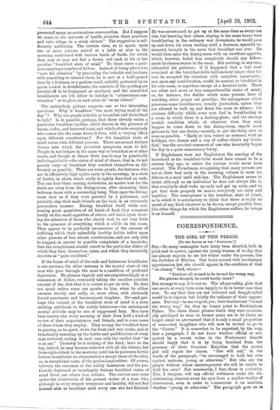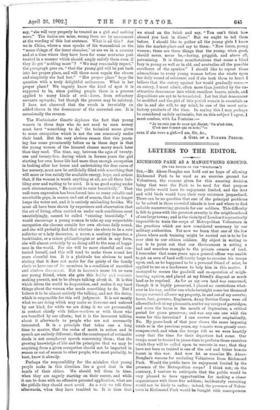CORRESPONDENCE.
THE GIRL OF THIS PERIOD.
[To THI EDITOR OF THY " SPEOTATOlt."]
Sra,—So many onslaughts have lately been directed, both in print and in speech, against the young woman of to-day that one almost expects to see her wither under the process, like the Jackdaw of Rheims. One looks around with involuntary apprehension lest she should appear in the condition of that " on-chancy " bird, whose- " Feathers all seemed to be turned the wrong way, His pinions drooped, he could hardly stand."
But strange to say, it is not so. The all-pervading girls that one meets at every turn seem happily to be in better case than ever. To say that they are not withered and draggle-tailed would be to express but faintly the radiance of their appear- ance. But stay--in one respect, yes ; their feathers are" turned the wrong way," for they no longer point to Buckingham Palace. The three Court plumes which they were occasion- ally privileged to wear in former years are to be theirs no longer, since we are warned that it is only a small proportion of unmarried daughters who will now be invited to go to the "Courts." It is somewhat to be regretted, by the way, that a paragraph, I do not know whether official or not, quoted by a recent writer in the Westminster Gazette should imply that it is by being banished from the presence of their Gracious Majesties that the young girl will regain her charm. "She will not," in the words of the paragraph, "be encouraged to hold her own against matrons, young or otherwise." But who are the people without whose encouragement she will be unable to hold her own ? Not necessarily, I fear, those in authority. Nor, I imagine, will any official ordinance make the dis- criminating observer avert his eyes from a maiden worthy of observation, even in order to concentrate it on matrons, whether "young or otherwise." The paragraph goes on to
say, "she will very properly be treated as a girl and nothing snore." The italics are mine, wrung from me by amazement at the wording of this last sentence. What is all this ? Are we in China, where a man speaks of his womankind as the "mean things of the inner chamber," or are we in a country and at a time where they have been for some centuries past treated in a manner which should amply satisfy them even if they do get "nothing more " ? "We may reasonably expect," the paragraph goes on, "that the young girl will be put back into her proper place, and will there soon regain the charm and simplicity she had lost." "Her proper place" begs the question with a truly delightful artlessness. What is her proper place ? We vaguely know the kind of spot it is supposed to be, since putting people there is a process applied to many kinds of evil - doers, from refractory servants upwards; but though the process may be salutary, I have not observed that the result is invariably an added charm in the demeanour of the corrected one. It is occasionally the reverse.
The Westminster Gazette deplores the fact that young women in these days who do not need to earn money must have "something to do," the technical name given to some occupation which is not the one commonly under their hand. But the very obvious reason that this yearn- ing has come prominently before us in these days is that the young women of the leisured classes marry much later than they used. The time, say, between the ages of twenty- one and twenty-five, during which in former years the girl starting her own home life bad more than enough occupation in looking after her house and undertaking the dear cares of her nursery, must now be artificially filled with something that will more or less satisfy the available energy, hope, and ardour that, if the woman is worth anything at all, are all there bub- bling over and waiting to be used. It is no good saying under such circumstances, "Be content to exist beautifully." That well-worn expression has been forced into so many suitable and unsuitable gaps, in season and out of season, that it no longer keeps the water out, and it is entirely misleading besides. We must all have been shown by experience and observation that the art of living, often carried on under such conditions most =satisfyingly, cannot be called "existing beautifully." I would encourage a young woman to take up any respectable occupation she chooses outside her own obvious daily round, and she will probably find that whether she elects to be a rate collector or a lady decorator, a nurse, a sanitary inspector, a bookbinder, or a minor philanthropist or artist in any form, she will almost certainly by so doing add to the sum of happi- ness in the world. For she will be more cheerful and con- tented herself, and this will tend to make those round her more cheerful too. It is a platitude too obvious to need stating that it does not make for the gaiety of the family circle to have one of its members in a condition of unsettled and aimless discontent. But in heaven's name let us warn our young friend, when she gets this hobby aud content- making pursuit, not to be always talking about it. It is this which drives the world to desperation, and makes it say hard things about the woman who needs something to do. But I believe it to be almost entirely the talking, and not the doing, which is responsible for this evil judgment. It is not mostly what we are doing which may make us tiresome and unloved by our kind, for while we are doing it we are presumably in contact chiefly with fellow-workers or with those who are benefited by our efforts ; but it is the incessant talking about it afterwards to people who are not necessarily interested. It is a principle that takes one a long time to master, that the codes of merit in action and in speech are entirely different; that the counterpart of estimable deeds is not complacent speech concerning them ; that the growing knowledge of life and its principles that we may be acquiring from a given occupation should not be imparted in season or out of season to other people, who most probably, to boot, know it already.
Perhaps the responsibility for the mistakes that young people make in this direction lies a good deal in the hands of their elders. We should tell them in time, when they are eagerly starting on their career, and while it can be done with no offensive personal application, what are the pitfalls they should most avoid. As a rule we tell them afterwards, when they have tumbled in. It is then that
we stand on the brink and say, "You can't think bow absurd you look in there." But we ought to tell them before. I should like to gather all the young girls I know into the market-place and say to them : "Now listen, young women ; there are three things that the young, when good, should never, never be,—boring, priggish, and above all, patronising. It is these manifestations that rouse a blind fury in young as well as in old, and neutralise all the possible excellence of the speaker." I should like to repeat these admonitions to every young woman before she starts upon her daily round of existence, and if she took them to heart I believe that the outcry against her would gradually cease,— an outcry, I must admit, often more than justified by the un- attractive demeanour into which excellent hearts, minds, and dispositions are apt to be translated. Let but that demeanour be modified and the girl of this period remain in essentials as she is, and she will, to my mind, be one of the most satis- factory products of the time. In saying this I may perhaps be considered unduly optimistic, but on this subject I agree, 1 must confess, with La Fontaine :—
"Jo ne suis pas de ceux qui disent, Ce &est rien, C'est une femme qui Be nole,'"— even if she were a girL—I am, Sir, &c.,
A GIBL OF A PORI= PERIOD.



























































 Previous page
Previous page